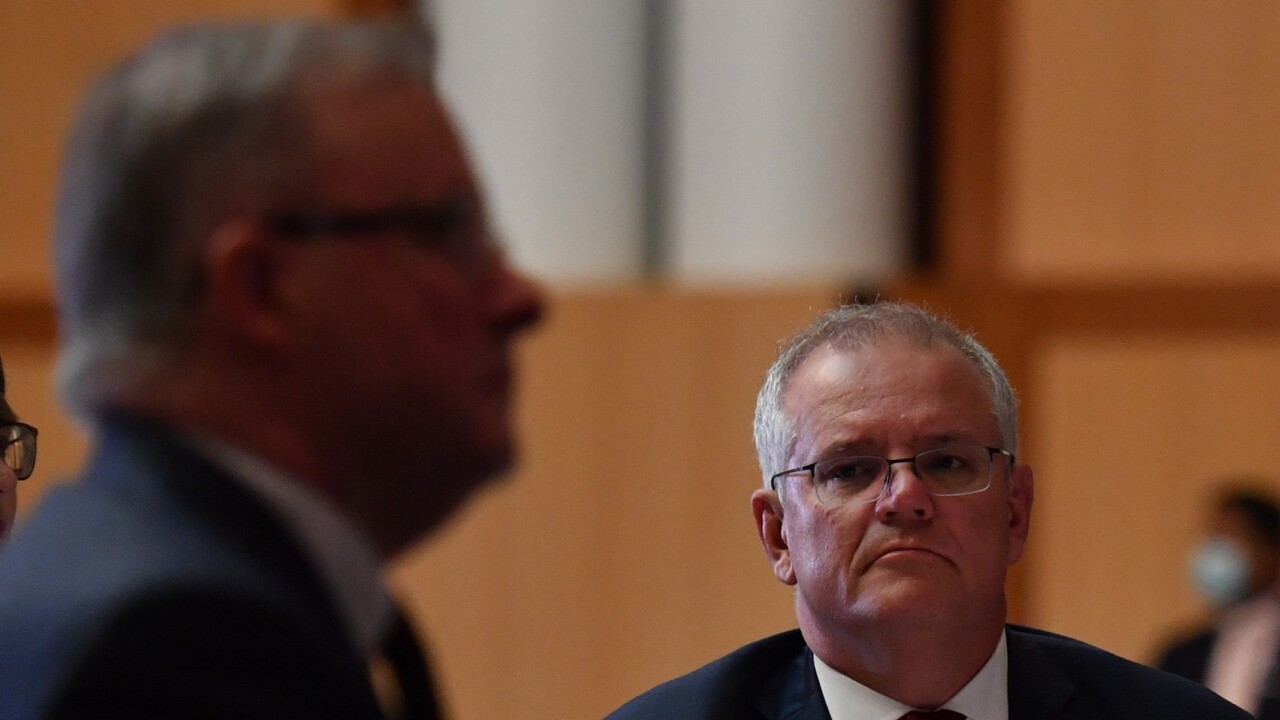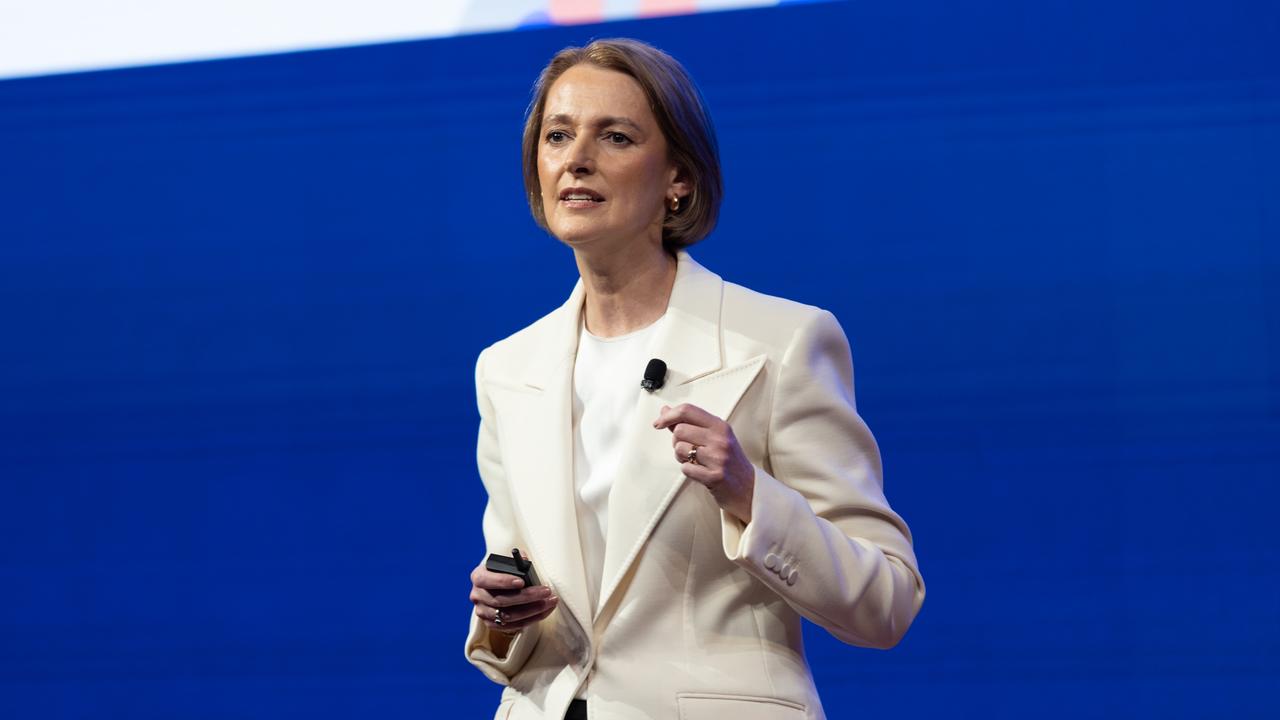Federal election 2022: A chance for Scott Morrison as cost of living election takes off

Only three months ago such a victory was hard to imagine, but look what has happened since.
Food and grocery prices are rising. Mortgage rates are increasing ahead of an RBA rate rise expected in June, the first in over a decade.
Petrol prices, despite falling in the last week even more than the 22c tax cut at the bowser, have hiked dramatically this year as the energy crisis grips global markets.
Yet real wages have not risen and Australians have no confidence that they will rise any time soon.
If the electorate gets the message that Labor’s spending will be high, with no better solution to wages growth than the Coalition, and if it gets the message that higher spending means higher inflation, then there is every chance that Scott Morrison’s spin power will get him across the line.
Anthony Albanese told voters on Sunday that if they wanted to build a better Australia, they had to vote for it.
His attack on the budget as a cynical short-term election sugar hit has truth to it, but Labor can claim no moral high ground here. It is matching the cash splash to the cent.
This campaign may well get ugly and personal, but on Sunday morning the Prime Minister did not mention Anthony Albanese’s name once in his campaign pitch to the nation. He did not even refer to him as the leader of the opposition. It was Labor he targeted: voters had a choice between the government-built strong economy and a Labor opposition that would weaken it.
And he said it again. “A choice between an economic recovery that is leading the world, and a Labor opposition that would weaken it and risk it.”
There were no folksy references to Jenny and the kids, no personal references at all, in contrast to Anthony Albanese in his campaign kick-off following photo opportunities with his partner at Sydney’s Royal Easter Show.
Instead, in a crisp address, the Prime Minister talked up Australia’s triple A credit rating and a 40-year low in unemployment as proof of responsible financial management.
It is not right to say this battle is all about the two leaders because there is no policy to fight over. There are differences in policy and they emerge at a time when the priorities of the electorate have also been shifting.
These priorities have shifted away from the health and lockdowns that created an 18-month lives-versus-livelihoods debate, to real worries over the cost of living.
So when Albanese announced a fully costed reform to aged care in his budget reply but did not include the cost of wage rises in aged care required to fulfil Labor’s vision, and then could not explain where the money would come from, the government pounced.
And when Labor last week announced that the government’s arbitrary spending cap in the budget at 23.9 per cent of GDP would be dropped, it was another Howzat! for Scott Morrison and Treasurer Josh Frydenberg.

On Sunday the PM made a point of mentioning taxes: “Our plan does deliver tax relief for workers and for small businesses to help you get ahead and to ensure you deal with the cost of living pressures right here right now.” Contrast that, he said, with a Labor opposition that would always increase taxes if given the opportunity.
Cost of living pressure has also demoted climate change as a priority across the broader electorate. Perhaps this is not enough to blunt the ambitions of the Simon Holmes a Court-backed independents in the leafier electorates but as a broader issue, but Albanese’s pledge to end the climate wars on Sunday, even if believable, has nothing like the traction it might have had ahead of COP26.
The message in Anthony Albanese’s speech was about building a better future that addresses vulnerabilities in the economy.
For Labor that means access to cheaper childcare, “fixing” aged care and free TAFE, all structural reforms which require billions of dollars in ongoing funding.
These policy priorities are very different to the Coalition and while Labor says its proposals will be fully costed, its credibility will be questioned by the government.
Labor believes that spending on TAFE and childcare will increase productivity, upskilling workers and offering more opportunity. However, changes to childcare and to aged care are complex and difficult to explain at grassroots level.
Notably, there was very little new money in the May budget on anything with “care” attached to it.
Inevitably the government will argue that Labor’s reckless spending is not properly costed and will threaten a strong economy.
In the Prime Minister’s words on Sunday: “Only a strong economy can guarantee the essential services that you rely on.”
Neither the government nor Labor have any credibility on delivering real wage increases. For business and the Coalition, this has to be productivity-led. Labor is not clear at all on this point.
On Sunday, Anthony Albanese said as prime minister he would bring employers and unions together. If this means empowering unions to have greater leverage in EBAs without delivering productivity gains through flexibility, this will be fertile ground for debate. Fear can be a powerful emotion, as Albanese acknowledged in his speech.
Anthony Albanese said on Sunday that no one in parliament had closer ties to the business community than he did, a claim that hyper-connected Treasurer Josh Frydenberg or the tradies’ great mate Scott Morrison might contest.
The government will press Albanese’s lack of financial portfolio experience and his left leaning background. Shadow treasurer Jim Chalmers will be critical in Labor’s campaign for economic credibility.
For months he has been courting big business and is well respected. The challenge is convincing the broader electorate of this credibility.
Chalmers is even more important after the Mean Girls branding cramped the style of otherwise strong campaigners like Penny Wong and Kristina Keneally. Bill Shorten will be used very sparingly indeed.
Morrison himself has political flak from his intervention on NSW preselections, and his comment on Sunday that Australians are sick of politics is laughable.
But he has strong campaigners in Josh Frydenberg, Peter Dutton and Barnaby Joyce for the regions.
Note, however, that Frydenberg will keep a close eye on his own seat, where more campaign time and money will be needed to fend off one of those Holmes a Court-backed independents.






If Scott Morrison grabs victory from the jaws of defeat on May 21, it will be because of inflation.